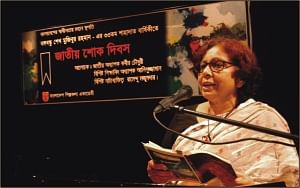Recalling Bangabandhu

Dr. Anwara Syed Haque recites at the programme. Photo: Mumit M.
August 15, 2008 marked the 33rd death anniversary of Bangabandhu Sheikh Mujibur Rahman, the founding leader of Bangladesh. On the occasion Bangladesh Shilpakala Academy (BSA) organised a discussion and a cultural programme at National Theatre Stage, BSA.
On this day in 1975, Sheikh Mujibur Rahman was assassinated along with members of his family at his Dhanmondi 32 residence. Almost all members of the Mujib family were killed except for his two daughters -- Sheikh Hasina and Sheikh Rehana -- who were in Germany at the time.
The programme started at 7 pm with a discussion. National Professor Kabir Chowdhury, educationist Professor Anisuzzaman and theatre personality Ramendu Majumder took part in the discussion. Bhuiyan Shafiqul Islam, director general, BSA, presided over the session.
The discussants spoke on Sheikh Mujib and recalled their personal memories of the great leader.
Ramendu Majumder read out excerpts from his book titled “Bangladesh Amar Bangladesh,” a compilation of Bangabandhu's speeches (between 1970 to '72).
Recalling the Father of the Nation, Ramendu Majumder said, “During the riots in 1964, we lived near the Tejgaon Polytechnic Institute. On that night we could here screaming from a distance; the train at the crossing was stopped and the Hindu passengers were dragged out and butchered. We were very scared. My sister in-law's uncle, Professor Ajit Guha, called Sheikh Mujib on the phone. After a while we saw a jeep stopping at our house -- there was Sheikh Mujib himself, he took us with him to his Dhanmondi residence. That night at his house we saw many other Hindu families, whom he brought over and provided with security from the riots.”
Ramendu Majumder also recalled Mujib's contribution to theatre. “In 1974, Mujib issued a presidential order to exempt theatre from taxes, which was a great contribution to the art form,” he said.
Professor Kabir Chowdhury said, “Sheikh Mujib loved his people with all his heart. He trusted them as his own children, which is why despite receiving several warnings of a conspiracy against him, he paid little attention to his security.”
“While going over the constitution, Mujib paid meticulous attention to every detail,” he added.
Professor Anisuzzaman said, “Mujib was able to unite Bengalis, which was a great achievement; and that unity resulted in victory of the election in 1970."
The speakers called for the punishment of Sheikh Mujib's killers and the trial of war criminals.
The cultural programme comprised recitation and renditions of songs. Leading poets and artistes of the country recited poems.
Poet Nirmalendu Goon recited Suborno Golaper Jonyo, a poem he composed during the hartal on June 7, 1966. Poet Mahadev Saha recited Ei Naam Shototsharito, a poem on Bangabandhu. Kazi Abu Zafar Siddiqui recited Shamsur Rahman's Tomar-e Padodhwani. Dr. Anwara Syed Haque recited Amader Ekta Gachh Chhilo and Asaduzzaman Noor recited the poem Ami Ki Boltey Perechhilam by Mahadev Saha.
The musical part of the programme, titled Shok Sangeet, started with a performance by Tagore singer Ferdousi Ahmed Lina. Noted singers Ajit Roy, Shaheen Samad, Bipul Bhattacharjee, Malay Kumar Ganguli and Bulbul Moholanobish sang at the programme.
A photo exhibition was also held at National Theatre Stage premises featuring photographs of Bangabandhu on historic occasions -- the speech on March 7, with General Ataul Gani Osmani and Maulana Bhashani, the 1970 election, Mujib in tears after returning home in 1972 and more.

 For all latest news, follow The Daily Star's Google News channel.
For all latest news, follow The Daily Star's Google News channel. 



Comments